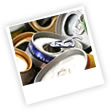Recycling: a source of clean energy

Nowadays we all try to minimise energy consumption in the house and at work, partly to save money and partly because we want to help reduce pollution. However, we don’t always stop to think that the majority of energy that we consume in the home is not the energy used to power light bulbs and household appliances, but the energy used to manufacture the infinite products the surround us in our daily life.
Take a simple drinks can, for example: it takes 14 KWh of energy to extract 1 kg of new aluminium from bauxite, but only 0.7 KWh to recycle 1 kg of used aluminium. that’s an energy saving of 95%. Consider that the energy saved from recycling one aluminium can is enough to run a TV set for 3 hours!
Recycling used cans also reduces the amount of waste buried in landfills and the exploitation of our planet’s minerals, a finite resource. The same can be said for other materials. If every person in a town of 100,000 inhabitants recycled 30 kg of plastic, equal to their average yearly consumption, 10,000 tonnes of petroleum and coal would be saved. It takes 15 trees, 440,000 litres of water and 7,600 KWh of electricity to produce one tonne of virgin paper, whereas one tonne of recycled paper takes just 1,800 litres of water and 2,700 KWh of electricity to produce. Glass recycling in Italy saves 400,000 tonnes of oil every year. In short, to consume less we need to recycle more!





